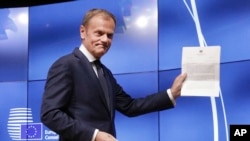EU negotiators have hiked possible payment demands for Brexit over recent weeks, officials say, widening the divide between Brussels and London, which questions whether it owes anything at all before talks start next month.
Hours before chief negotiator Michel Barnier was due to give more details on the EU's standpoint, a Financial Times headline saying the EU might seek an upfront payment in 2019 of up to 100 billion euros ($110 billion), drew an immediate rejection from Britain's Brexit Secretary David Davis that he would pay that sum.
The European Commission has previously given a ballpark estimate of the bill of about 60 billion euros. The FT said the calculations it referred to would result in a net payment from Britain of roughly that level, after subsequent reimbursements.
One senior EU official involved in preparing for the talks after a British election on June 8 said he did not recognize the 100-billion-euro figure, although a number of private calculations of the bill have gone as high or even higher.
Last month, the Bruegel think-tank in Brussels put the up-front payment for Britain as high as 109 billion euros under one of many scenarios for the calculation. Later reimbursement would bring the net figure to 65 billion, Bruegel's study showed.
Over the past month, the 27 other member states have drafted negotiating guidelines for the executive Commission that leaders agreed on Saturday. In the course of drafting, governments insisted on clarifying that Britain be made to pay up front for, among other things, contingent liabilities for guarantees on loans made by, for example, the European Investment Bank.
A document seen by Reuters outlining Barnier's plans for negotiations, showed he has a plan to calculate up-front payment for contingent liabilities, to be repaid later: "This calculation will also identify the amounts covering or guaranteeing loans which have to be reimbursed to the United Kingdom if uncalled, on the basis of the maturity of the loans."
Barnier has repeatedly said that the final amount cannot be calculated until Britain is leaving, since the EU budget will change. However, EU leaders want agreement on the "methodology" for the calculation among several conditions for opening the talks on a future free trade deal that Britain is seeking.
Leaders hope that agreement could be reached by December.
However, concern is rising in Brussels that talks might collapse as the rhetoric from both sides intensifies and British Prime Minister Theresa May fights a snap election she called last month, increasing the possibility of Britain leaving in a legal limbo in March 2019 that would be damaging all round.
European Commission President Jean-Claude Juncker was quoted as saying after a dinner with May last week that he saw a major risk of failure as the two sides were so far apart.
Some EU officials are concerned that governments and the EU institutions may be adding to that risk by loading public demands on Britain when they know that, in the end, a settlement is likely to mean substantial compromise on both sides.





